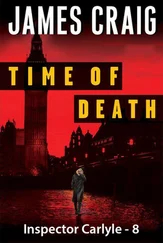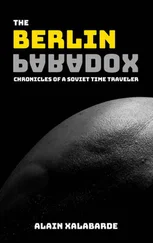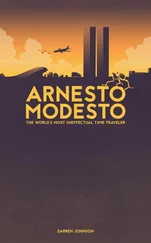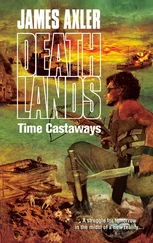James Gleick - Time Travel
Здесь есть возможность читать онлайн «James Gleick - Time Travel» — ознакомительный отрывок электронной книги совершенно бесплатно, а после прочтения отрывка купить полную версию. В некоторых случаях можно слушать аудио, скачать через торрент в формате fb2 и присутствует краткое содержание. Год выпуска: 2016, Издательство: Knopf Doubleday Publishing Group, Жанр: Старинная литература, на английском языке. Описание произведения, (предисловие) а так же отзывы посетителей доступны на портале библиотеки ЛибКат.
- Название:Time Travel
- Автор:
- Издательство:Knopf Doubleday Publishing Group
- Жанр:
- Год:2016
- ISBN:нет данных
- Рейтинг книги:5 / 5. Голосов: 1
-
Избранное:Добавить в избранное
- Отзывы:
-
Ваша оценка:
- 100
- 1
- 2
- 3
- 4
- 5
Time Travel: краткое содержание, описание и аннотация
Предлагаем к чтению аннотацию, описание, краткое содержание или предисловие (зависит от того, что написал сам автор книги «Time Travel»). Если вы не нашли необходимую информацию о книге — напишите в комментариях, мы постараемся отыскать её.
Time Travel — читать онлайн ознакомительный отрывок
Ниже представлен текст книги, разбитый по страницам. Система сохранения места последней прочитанной страницы, позволяет с удобством читать онлайн бесплатно книгу «Time Travel», без необходимости каждый раз заново искать на чём Вы остановились. Поставьте закладку, и сможете в любой момент перейти на страницу, на которой закончили чтение.
Интервал:
Закладка:
One consequence of Hitler’s being the favorite victim of time-traveling assassins is that he keeps on coming back to life. Here he is, living in the Amazon jungle, ninety years old, in George Steiner’s novel The Portage to San Cristóbal of A.H. Or alive and well in Berlin, still führer of the Greater German Reich, having won World War II in Robert Harris’s Fatherland. Or syphilitic and senile, in The Man in the High Castle by Philip K. Dick—Germany has won the war, because in this history it was the young Franklin D. Roosevelt who was assassinated before he could put his strong hand on the tiller of history. The variations on this theme continue to multiply. As a literary genre, these counterfactual narratives are called alternative history in English, or ucronía, uchronie, etc., or allohistory. The labels arose only in the mid to late twentieth century, when the genre began to explode, fed by time travel and branching universes, but in 1930 James Thurber was presciently satirizing it in the New Yorker magazine, in his story “If Grant Had Been Drinking at Appomattox” (identified as a follow-up to “If Booth Had Missed Lincoln,” “If Lee Had Won the Battle of Gettysburg,” and “If Napoleon Had Escaped to America”). Professionals ask similar questions these days. The humor bleeds into academic historiography. It’s possible to become quite obsessed with historical contingency. In a comprehensive study, The World Hitler Never Made, Gavriel D. Rosenfeld analyzed as many of the Nazi variations as he could find to see how many ended up making history “the same or worse without Hitler as opposed to being better.” *6There are few happy endings, he found. It is often the writers of science fiction or “speculative fiction” who give us, not only the weirdest, but the most rigorously analyzed approaches to the working of history.
It all might have been different. For want of a nail, the kingdom was lost. I coulda been a contender. Regret is the time traveler’s energy bar. If only… something. Every writer nowadays knows about the butterfly effect. The slightest flutter might alter the course of great events. A decade before the meteorologist and chaos theorist Edward Lorenz chose the butterfly for illustrative purposes, Ray Bradbury deployed a history-changing butterfly in his 1952 story “A Sound of Thunder.” Here the time machine—the Machine, a vague mess of “silver metal” and “roaring light”—carries paying sightseers on Time Safaris back to the era of the dinosaurs. Apart from the addition of oxygen helmets and intercoms, the time travel itself is pure Wells: “The Machine howled. Time was a film run backward. Suns fled and ten million moons fled after them….The Machine slowed; its scream fell to a murmur.” The Safari operators, though, try to be careful about leaving everything unchanged, because they worry about history.
A little error here would multiply in sixty million years, all out of proportion….A dead mouse here makes an insect imbalance there, a population disproportion later, a bad harvest further on, a depression, mass starvation….Perhaps only a soft break, a whisper, a hair, pollen on the air, such a slight, slight change that unless you looked close you wouldn’t see it. Who knows?
In the event, a feckless time-tourist steps on a butterfly: “an exquisite thing, a small thing that could upset balances and knock down a line of small dominoes and then big dominoes and then gigantic dominoes, all down the years across Time.”
The butterfly effect, though, is a matter of potential only. Not every flutter in the air leaves its mark on the ages. Most fade to nothing, damped by viscosity. That was Asimov’s assumption in The End of Eternity: that the effects of tampering with history tend to die out as the centuries pass, perturbations extinguished by friction or dissipation. His Technician confidently explains: “Reality has a tendency to flow back to its original position.” But Bradbury was right and Asimov was wrong. If history is a dynamical system, it’s surely nonlinear, and the butterfly effect must obtain. At some places, some times, a slight divergence can transform history. There are critical moments—nodal points. These are where you want to place your lever. History—our real history, that is—must be full of such moments or people, if only we could identify them. We imagine that we can. Births and assassinations, military victories and defeats. We focus on individuals, heroes and villains with an outsize influence. Hence the fascination with Hitler. If you could kill just one person… By and large, though, the creators of these fantasies have been wise enough to mock the hubris they imply. “Can anyone alter fate?” asks Philip K. Dick in The Man in the High Castle. “All of us combined…or one great figure…or someone strategically placed, who happens to be in the right spot. Chance. Accident. And our lives, our world, hanging on it.” Surely some people, some events, some decisions matter more than others. Nodal points must exist, just not necessarily where we think.
Stuck as we are in our own time, most of us aren’t trying to make history, much less change it. We take the days one at a time, and history happens. Clive James has said that the greatest poets aspire not to change literary history but only to enrich it. One more reason for the special fascination with Hitler is his playing God. “The Führer was different,” thinks Kate Atkinson’s Ursula Todd, “he was consciously making history for the future. Only a true narcissist could do that.” Beware the politician who aspires to make history. Ursula herself lives in her many moments, one timeline after another: “the future as much a mystery as the past.”
We cannot escape the alternative realities, the limitless variations. The OED carefully tells us that the word multiverse was “orig. Science Fiction” but now, alas, “Physics”: “the large collection of universes in the many-worlds interpretation of quantum mechanics…in which each in turn of the different possible outcomes occurs.” At the same time, entirely apart from quantum theory, we have discovered the pleasure and pain of virtual worlds, inside the computer or the matrix, forcing us to contemplate the possibility that we ourselves are characters in someone else’s simulated reality. Or our own. Nowadays, when one speaks of “the real world,” it is difficult to refrain from using ironic quotation marks. We inhabit virtual worlds as familiarly and as avidly as the real one. In virtual worlds time travel could not be easier.
Follow me down the rabbit hole into the looping tunnels. William Gibson will be our Virgil. He is reading The Alteration, a 1976 novel of alternative history by Kingsley Amis, better known for his comic satires of contemporary Britain. In this world Europe has succumbed to authoritarianism, but never mind Hitler—the papacy is in charge. The Reformation never happened, and the Catholic Church holds much of the world in a theocratic grip. Amis is, of course, investigating in a sidelong way his own, all-too-real world, just as Philip Roth is in The Plot Against America and Fry in Making History. Amis’s story opens in the Cathedral Basilica of St. George at Coverley, “the mother church of all England and of the English Empire overseas.” In passing we observe bits of perverted art history: Turner has evidently painted the ceiling “in commemoration of the Holy Victory,” Blake has decorated one wall with some holy frescoes, and the choir sings Mozart’s Second Requiem, “the crown of his middle age.” Science has been suppressed. Although it is 1976, there are wagons and oil lamps, but “matters electrical were held in general disesteem.” And there are wheels within wheels.
Читать дальшеИнтервал:
Закладка:
Похожие книги на «Time Travel»
Представляем Вашему вниманию похожие книги на «Time Travel» списком для выбора. Мы отобрали схожую по названию и смыслу литературу в надежде предоставить читателям больше вариантов отыскать новые, интересные, ещё непрочитанные произведения.
Обсуждение, отзывы о книге «Time Travel» и просто собственные мнения читателей. Оставьте ваши комментарии, напишите, что Вы думаете о произведении, его смысле или главных героях. Укажите что конкретно понравилось, а что нет, и почему Вы так считаете.












